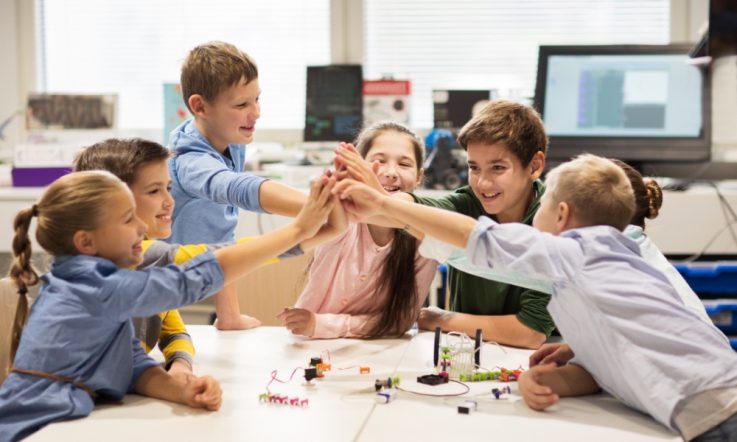As a newly developed school in 2013, Butler College in Perth, Western Australia, invested in creating a ‘culture' of continuous learning and development for all of its staff including teachers, education assistants, cleaners, gardeners and other support staff.
The initiative began in 2014 with just 47 staff and continues today with almost 300 staff and close to 2000 students. The goal of the whole-school approach is to encourage all staff to strive to be their own personal best in whichever role they are employed.
To ensure everyone is contributing to this culture, Butler College decided to gain feedback from students and parents through an online survey. As the school's Research & Development Consultant, I implemented the survey between 2016-2017 to seek feedback on various aspects about the school, learning and the impact of staff. The survey questions utilised an Appreciative Inquiry (AI) model, which takes a strengths-based approach.
The AI model focuses on investigating the strengths of an organisation and how to align these with stakeholder's needs (Coghlan, Preskill, & Tzavaras Catsambas, 2003) and is an approach used to facilitate positive transformations in a wide variety of organisations (Cooperrider, Whitney, & Stavros, 2003; Quinney & Richardson, 2014).
In Butler College's survey, close to 800 student responses were received on 13 open-ended questions. The question I've chosen to focus on in this article is: ‘What are students' perceptions about what contributes to their “most memorable” learning experiences (in all years at school)?'
The student voice (survey results)
Exploring students' responses to their ‘most memorable learning' experiences commenced with analysing words they used most frequently. As per the AI framework, the best and most positive experiences from participants are chosen to capture the ‘life' and ‘positive core' of the organisation; in this case the school.
The highest number of responses made mention of the ‘teacher' as being integral to their most memorable learning experiences. This aspect needed further interrogation into what it was about the teacher that made the experience notable.
Two key themes emerged under the broad theme of the teacher. The first referred to teacher attributes and the second referred to teachers' pedagogical approaches. These two key themes were intertwined and not necessarily mentioned in isolation.
Teacher attributes: Students used several words to describe the positive, personal attributes of teachers that made their learning experiences most memorable.
In students' perceptions, being ‘nice' or ‘good' (equal results), ‘helpful' and friendly' were listed as the top three teacher attributes contributing towards improving the teacher-student relationship leading to memorable learning experiences. A number of other terms were also used and have been collated under the attribute sub-theme of ‘kindness'.
Here are some examples:
“I mostly enjoy X as my favourite class, the practical work makes it fun and enjoyable. Also it depends if the teacher is nice or funny. Having a funny, and understanding teacher helps.” – Year 12 student
“The teachers in the classes would develop friendships with the students and could not only have discussions about the subject that's being taught by the teacher, but also have nice conversations with the students. The teachers treated the students like people [respect].” – Year 9 student
“Everything we learnt was in a fun way and I liked doing fun in class activities, experiment, games etc.” - Year 7 student
Pedagogical approach: In relation to teachers' pedagogical repertoire, students noted two key areas which supported and enhanced learning experiences. The first aspect was around specific ‘student engagement' and the second was ‘teacher instruction'.
Student engagement was referred to when teachers provided what students termed ‘fun' learning activities through games, multi-modal approaches to teaching, teacher enthusiasm and humour.
Here are some examples:
“…is one of my best classes as our teacher teaches in multiple ways by saying things, writing, and interactive games which gives a fun way to learn.” – Year 9 student
“I enjoy when we have class discussions and when the teacher teaches so I understand the content.” – Year 9 student
Teacher instruction included simple and clear (explicit) instruction, questioning, interaction and support for learning.
Here are some examples:
“The things that made the learning experience the best was how the teachers explain things in a simple and understandable way” – Year 7 student
“The teacher used a PowerPoint and broke the subject down slowly. It made me draw attention to the speaker and achieve the grades I wanted.” – Year 11 student
The school's response to the student voice
The school leadership is determined to provide an authentic and well- supported approach to developing performance rather than managing performance. To do this, the teaching staff have been participating in a peer-to-peer coaching framework.
Approximately 150 teachers have been involved in this process, where the focus has been on regular improvement of teaching practice with a focused approach. Staff are accountable and supported by their peer, line manager and myself, as the research and development consultant. The student data has been shared in small portions with all staff through fortnightly morning pedagogy sessions.
The results link closely to AITSL Standard 4: ‘Create and maintain supportive and safe learning environments'. To ensure that the student voices at Butler College have been heard and responded to by the staff, a focus on Standard 4 has been implemented across the school in 2018.
Teachers have been encouraged to consider the practices of Standard 4 alongside other goals (if they choose additional teaching goals). Plans for explicit pedagogy sessions that provide examples about Standard 4 (linked to results) are also in progress to be presented through the year by teaching staff at the college.
References
Cooperrider, D. L., Whitney, D. K. & Stavros, J. M. 2003. Appreciative inquiry handbook, Bedford Heights, OH, USA, Lake Shore communications.
Coghlan, A. T., Preskill, H. & Tzavaras Catsambas, T. 2003. An overview of appreciative inquiry in evaluation. New directions for evaluation, 2003, 5-22.
Quinney, S. & Richardson, L. 2014. Organisational development, appreciative inquiry and the development of Psychologically Informed Environments (PIEs). Housing, Care and Support, 17, 95-102.
This school focuses on improving teaching practice through a whole school approach, and all staff are held accountable. Think about your own setting. How are you supported to pursue your professional goals?
Butler College decided to capture student voice through an online survey. How do your ensure students are given a space to voice their views? Do you have a structure in place to make changes or improvements in response to these views?



